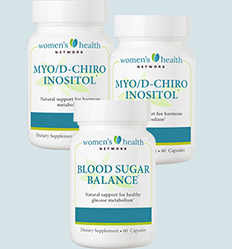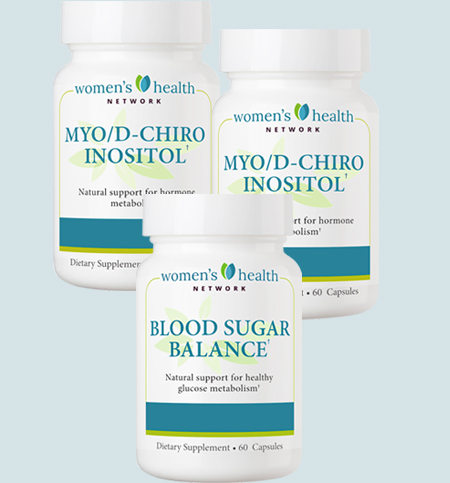Authored by Dr. Sharon Stills, NMD
PCOS (Polycystic Ovary Syndrome) is a common hormonal disorder that affects women of reproductive age. It is characterized by a combination of symptoms related to hormonal imbalance and disrupted ovulation. Women with PCOS may experience irregular menstrual periods, excess androgen levels leading to hirsutism (excessive hair growth) and acne, and enlarged ovaries with multiple small cysts.

To resolve and treat PCOS naturally, you’ll have the best success with a combination approach that helps restore hormonal balance naturally. This path to wellness includes enriched nutrition, regular exercise, targeted nutritional supplements, effective hormonal support and attention to emotional health.
Women who use this method can often normalize insulin levels, regain their periods and get back to their lives.
Dietary changes: the foundational factor for healing PCOS
A low glycemic-load diet is the most useful tool when you are using food to restore healthy hormonal balance. This old standard is still the best way to be able to rank foods and compose meals and snacks according to their potential to increase your blood sugar and insulin levels.
These are the most important principles to consider when creating a diet to relieve PCOS symptoms:
- Reduce your intake of simple carbohydrates and refined sugars. This is absolutely crucial because these foods quickly exacerbate any preexisting metabolic and hormonal imbalances associated with PCOS. By limiting or eliminating simple carbohydrates (white breads, pasta, potatoes, high-fructose corn syrup, sugar and white flour) you can normalize the amount of sugar in your bloodstream. For many women with PCOS, this single measure can restore regular menstrual cycles.
- Eat lower carbohydrate meals balanced with fiber and healthy fats. The ideal amount of carbs depends on your body type and activity level. Choose complex carbohydrates like root vegetables, legumes, fruits and whole grains. Healthy fat choices include olive oil, nuts and avocado.
You’ll also need to keep eating lean proteins like beans, hummus, eggs, fish, chicken and vegetarian meat substitutes. Other key diet changes that support hormonal balance include adding in leafy greens, vegetables like peppers and spinach, flax seeds, a quality multivitamin-mineral supplement, and omega-3 fatty acids.
Healthy weight loss
Weight loss can be beneficial for individuals with PCOS in several ways. First, it improves insulin sensitivity, reducing insulin resistance commonly associated with PCOS. This helps regulate blood sugar levels and hormonal balance. Second, weight loss can lower androgen levels, addressing symptoms like excessive hair growth and acne. Shedding extra weight can also enhance fertility by restoring regular ovulation and increasing the chances of successful conception. Lastly, weight loss reduces chronic low-grade inflammation associated with excess weight, alleviating inflammation-related symptoms.
Losing as little as 5% to 10% of body weight has been shown to improve insulin sensitivity, hormonal balance and fertility outcomes in women with PCOS. Don’t crash diet to reach this goal, because this approach rarely works, and just creates more weight issues. Instead, aim for weight loss that is healthy in a sustainable manner (aka slow and steady), using the diet changes above to steer the way.
Get more exercise
Exercise provides several benefits for women with PCOS.
- Exercise increases insulin sensitivity and helps with weight loss.
- About 150 minutes of moderate intensity exercise per week helps to regulate hormone levels, reducing androgen levels and, as a result, diminishing symptoms such as hirsutism, acne and male-pattern hair loss.
- Exercise is a potent tool for reducing chronic low-grade inflammation associated with PCOS, improving overall health.
- Physical activity supports mental well-being by reducing stress, anxiety and depression, which are common among individuals with PCOS.
Engaging in a combination of cardiovascular exercises (such as brisk walking, cycling or swimming) and strength training exercises can provide comprehensive benefits. Yoga and other low impact exercise still offer benefits. Whatever it is, just get moving! The best exercise to start taming your PCOS symptoms can be as simple as a 20-minute brisk walk, ideally taken after a meal to help with blood glucose metabolism.
Natural supplements
Natural supplements can provide therapeutic support for PCOS symptom relief. Supplements often used in the holistic treatment of PCOS include:
- Inositol. This naturally occurring compound is highly beneficial for supporting insulin sensitivity and healthy blood sugar levels. For therapeutic effectiveness, look for supplements that contain inositol in the forms Myo-inositol and D-chiro inositol. By addressing insulin resistance, inositol can help regulate hormone imbalances, reduce elevated testosterone levels and promote regular ovulation, improving fertility. Additionally, inositol helps to relieve common PCOS symptoms such as acne, unwanted hair growth, and irregular periods. Inositol as Myo-inositol and D-chiro inositol is a foundational formula in our PCOS Support Combo.
- Herbal support for blood sugar balance. Medicinal herbs including banaba, gymnema and bitter melon work together to enhance insulin sensitivity and balance blood sugar levels, helping to alleviate PCOS symptoms and improve overall metabolic health.
- Banaba: This traditional medicinal plant from Southeast Asia contains corosolic acid, a key active compound shown to help lower blood sugar and improve insulin sensitivity.
- Gymnema: Reduces sugar cravings and supports healthy blood glucose levels by improving insulin function.
- Bitter Melon: Contains several bioactive compounds (charantin, polypeptide-p, and vicine) that have insulin-like effects, improving glucose uptake and insulin sensitivity.
- Chromium. Chromium is a mineral that plays a role in insulin function. Supplementing with chromium may help improve insulin sensitivity and glucose metabolism in individuals with PCOS. Our Blood Sugar Balance supplement is formulated with both herbal and chromium support.
- Alpha-lipoic acid. ALA is a natural compound with antioxidant properties that has shown potential benefits in managing PCOS, including improving insulin sensitivity and reducing oxidative stress and inflammation. ALA may also aid in weight management, improve lipid profiles and potentially improve fertility.
- Omega-3 fatty acids. Omega-3 fatty acids, typically found in fish oil supplements, have anti-inflammatory properties and may help reduce inflammation associated with PCOS. They may also support hormone balance and improve lipid profiles.
- Bioidentical progesterone. Another natural hormonal option is bioidentical natural progesterone. This can help offset a progesterone deficit and counter the effects of estrogen and androgens to relieve many PCOS symptoms and promote more predictable periods.
- Probiotics. Probiotics are beneficial bacteria that can help support gut health and reduce inflammation. They may have positive effects on insulin resistance and hormone balance in women with PCOS.
- Vitamin D. Many individuals with PCOS also have lower levels of Vitamin D or an outright Vitamin D deficiency. Supplementing with Vitamin D may help improve insulin sensitivity and support overall health.
Lifestyle changes make a difference for women with PCOS
With PCOS, little daily habits can add up to big changes. Here are a few small shifts in lifestyle and diet that can help you achieve healthy hormonal balance, and put your PCOS in the past.
Concentrate your efforts on these goals:
- Clear detoxification pathways. For optimal, and natural, hormone production, metabolism, balancing and recycling, avoid as many common endocrine-disrupting chemicals as possible. The best foods for detox are those rich in phytonutrients like beans, broccoli, cabbage, collards and kale. Consider trying a good multivitamin-mineral complex to support the hormonal transformation pathways in the liver. Find an exercise that makes you sweat — one that you can commit to doing regularly. Sweating is an essential part of your natural detox processes.
- Create a personalized low-glycemic load diet. Spend some time tailoring the traditional low-glycemic diet to fit your tastes. In terms of numbers, aim to limit your carbohydrate intake to about 16 grams per meal, and 7 grams each for two snacks a day. Again, you may need to adjust a bit here and there depending on your body type. Just know that the more closely you stick to low-glycemic foods, the better for improving your hormonal balance.
- Tend to your emotions. Emotional turmoil is one of the less familiar symptoms of PCOS, and it’s often missed by practitioners. Let’s face it — being told you have PCOS is stressful! But at the same time, stress reduction is an important component when you need to reduce any form of insulin resistance. Be proactive and seek out emotional support as you work to restore hormonal balance and relieve insulin resistance. One of our favorite PCOS support sites is PCOS Diva because it focuses on healthy foods and offers tips for good self care.
Remember, since your own PCOS picture may not look like anyone else’s, it’s good to make a plan to see a healthcare professional to discuss your concerns. Make sure you ask about all the effective, natural treatments available so you can find the right combination of steps for your individual situation.
You can take action to heal PCOS — and the sooner you get started, the sooner you will see a difference!
References and further reading
Berent-Spillson, A., et al. 2011. Insulin resistance influences central opioid activity in polycystic ovary syndrome. Fertil. Steril. [Epub ahead of print.] URL (abstract): https://www.ncbi.nlm.nih.gov/pubmed/21486668
References for key points:
http://www.acog.org/Patients/FAQs/Polycystic-Ovary-Syndrome-PCOS
http://www.ncbi.nlm.nih.gov/pubmed/17304034











